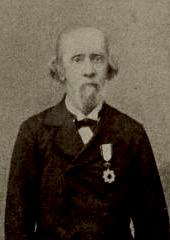Divie Bethune McCartee
| Divie Bethune McCartee | |
|---|---|

Protestant Missionary to China
|
|
| Born |
January 13, 1820 Philadelphia, Pennsylvania, United States |
| Died | July 17, 1900 (aged 80) San Francisco, California, United States |
| Education | Columbia University, University of Pennsylvania |
| Title | A. M., M. D. |
| Parent(s) | Robert McCartee (1791-1865) Jessie Graham (1796-1855) |
Divie Bethune McCartee (Simplified Chinese: 麦嘉缔) (1820–1900) was an American Protestant Christian medical missionary, educator and U.S. diplomat in China and Japan, first appointed by the American Presbyterian Mission in 1843.
In 1845 he organized the first Protestant church on Chinese soil. He later served as United States Consul at Ningbo, China and was also judge of the "mixed court" at Shanghai. His career in Japan led him to be a professor in the Imperial University at Tokyo, and he was also Secretary of the Chinese legation there. His prolific writings covered Asiatic history, linguistics, natural science, medicine and politics in the publications of the American Geographical Society, the American Oriental Society and other associations.
Born in Philadelphia, the oldest son of Dr. Robert McCartee of New York, Divie McCartee entered Columbia University, New York City, at the age of 14 and graduated from the University of Pennsylvania Medical School at 20. In June 1843 while engaged in the practice of medicine in Philadelphia, he received a message from the Board of Foreign Missions of the Church that he was needed to go to China as a pioneer and medical missionary. After consulting with members of his family, he agreed to go.
McCartee sailed for China in 1843 and arrived in Ningbo, Zhejiang, China in 1844. He began working primarily in medicine and evangelism. He was likely the first Protestant missionary, and certainly the first physician, to reside on Chinese soil following the First Opium War. He soon mastered the Chinese language, and his linguistic skills would be put to a variety of future uses. He opened a mission at Ningbo, one of the five ports opened to foreign trade and intercourse by the Treaty of Nanking in 1842.
...
Wikipedia
